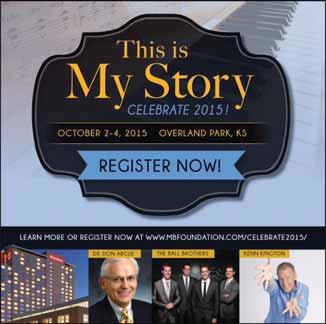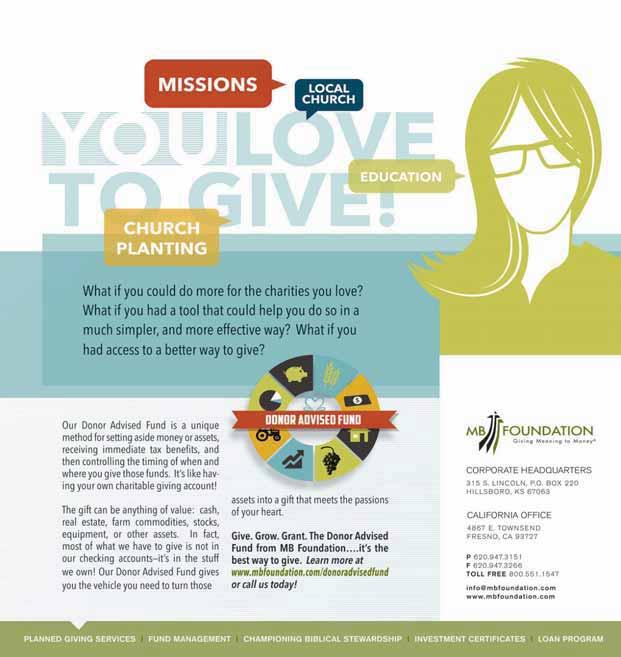
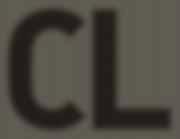




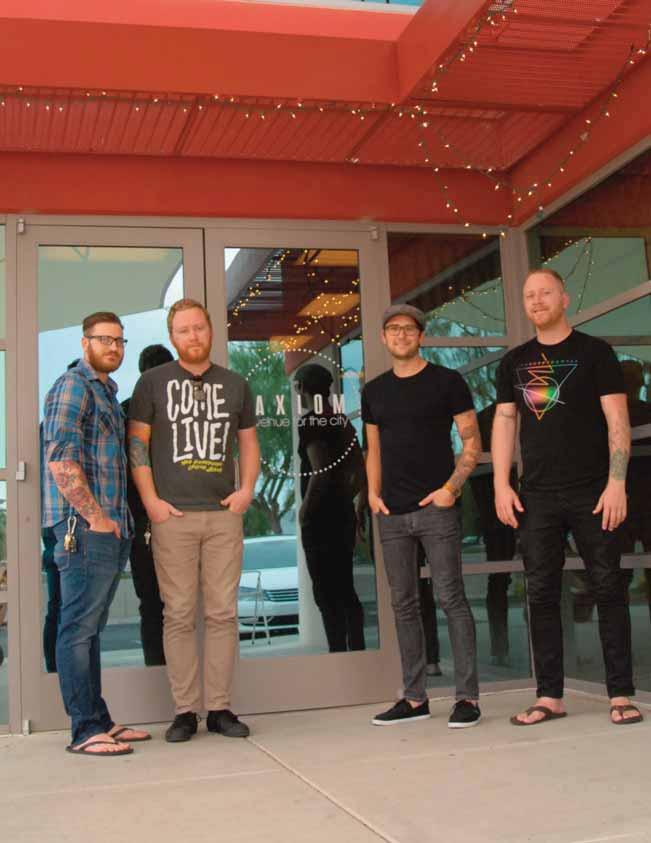



Sometime this summer—likely the end of June—the United States Supreme Court will make a decision on same-sex marriage—the justices deciding whether same-sex couples have a constitutional right to marry or whether state bans against this can stay in place.
While a recent LifeWay Research survey indicates that fewer than half of Americans say homosexuality is sinful, two-thirds of evangelical Christians say sex between two people of the same sex is sinful. We are certainly at odds with American culture over same-sex marriage.
While...fewer than half of Americans say homosexuality is sinful, two-thirds of evangelical Christians say sex between two people of the same sex is sinful. We are certainly at odds with American culture over same-sex marriage.

Connie Faber Editor
How will we, U.S. Mennonite Brethren, respond to a Supreme Court decision that is expected to rule in favor of legalizing same-sex marriage? Will we graciously listen to those with whom we disagree? Will we allow the Holy Spirit to show us how to teach and nurture a biblical understanding of sexual practice? How will we “model an attitude of living at peace with those in our communities who might differ in opinion with us?” (See the BFL letter to the U.S. Supreme Court on page 6.)
While the views of evangelical Christians regarding homosexual practice are solidly rooted in our conviction that according to the Bible such behavior is sinful, a recent LifeWay Research survey indicates that our views regarding same-sex marriage are also influenced by whether or not we have gay or lesbian friends. This study found that Americans with gay or lesbian friends are twice as likely to say samesex marriage should be legal as those who do not. Friendships with homosexuals affect evangelical Christians as well—but more in terms of legality than morality—says LifeWay.
Twenty percent of evangelicals who say they have no gay or lesbian friends say same-sex marriage should be legal. But among evangelicals who have such friends, agreement nearly doubles to 38 percent.
Seventy percent of evangelicals without gay or lesbian friends believe that “sex between people of the same gender is sinful, regardless of its legality,” while 62 percent of evangelicals with such friends still say likewise.
I see the “friendship factor” at work during discussions about homosexuality with my children—all three now in their early 20s. Many times our conversations include references to their high school and college acquaintances and friends who identify as gay or lesbian. My adult children are much more comfortable talking about homosexuality and related issues than I was at their age simply because they rub shoulders with gay and lesbian classmates, coworkers, friends and family members.
Even though evangelical Christians who have gay and lesbian friends may believe that sex between people of the same gender is sinful, they often seek a compassionate and redemptive response to these friends because of their connections. I encourage us to pray for those we know who have the opportunity to speak into the lives of gay and lesbian friends. That they can speak graciously and faithfully. May we support one another as we seek to embrace, love and listen to those who disagree with us on this divisive issue.







Aaron Halvorsen
Paulus






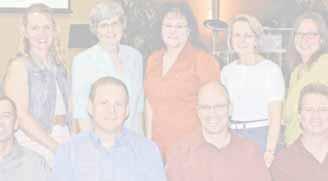


Aaron Halvorsen

Before sun, moon or stars shone, creation was bathed in light by the voice of God, which dispelled darkness and separated day from night. The rest of biblical history is a story of God filling creation’s dark crevices with his divine light.
The light of God’s presence led the Israelites in their liberation from Egypt (Exod. 13:21-22). So God is praised as their light and salvation (Ps. 27:1), whose word lights their path (Ps. 119:105). Tragically God’s people strayed, preferring sin and darkness. They needed enlightenment—liberation from blindness and redemption by light (Isa. 42:7). Such salvation comes by God’s chosen servant, who restores Israel and brings light to Gentiles (Isa. 49:6). Thus God’s people would not walk by sun or moon, but by God’s radiant, glorious light (Isa. 60:19-22). The Old Testament uses light as a picture of the life, presence, glory and salvation of God for Israel to the ends of the earth.
Then in John 8:12 we see Jesus of Nazareth at the Feast of Tabernacles claiming he is the light of the world and that whoever follows him will never walk in darkness but will have the light of life. This is no small claim. This is not just a good man asserting an able willingness to help people in need. This is a royal confession of divinity, a declaration that he is the longed-for Messiah bringing God’s salvation. He is the one and only Savior, the light of the world. He is God’s great global illumination plan.
This Christ-centered plan astoundingly involves God’s people. We who were once in darkness are now children of the light (Eph. 5:8-9), shining in darkness (2 Peter 1:19). “You are the light of the world” (Matt. 5:14). We have been sent by Christ in service of God’s plan to dismantle darkness with light and life.
The world is a dark place. News headlines, YouTube comments and our hearts all verify this. The world needs light, and we are tasked to bear that light. This can only be done by taking God’s light into the darkness. Our winsomeness, wisdom, generosity, strength and beauty are not enough. Apart from Christ, we have nothing to offer this world. We only add dark to darkness, midnight to black. We are faithful to our light-bearing mission only by shining the truth and love of Jesus.
Revelation depicts light’s final victory. There, John portrays a new creation where sun and moon do not shine, but heaven’s citizens walk by God’s glory and the lamp of the Lamb (Rev. 21:2227). This is no description of heavenly astronomical physics, but a vision of a reborn world where holiness has conquered sin by virtue of the Son of God. It is the culmination of God’s plan, light overcoming darkness through the Light of the world. May we all follow him and thereby have the light of life.
Aaron Halvorsen is lead pastor at Community Bible Church, a USMB congregation in Olathe, Kan.

July / August 2015
Volume 78 • Number 4
Connie Faber EDITOR
Myra Holmes ASSISTANT EDITOR
Shelley Plett
GRAPHIC DESIGNER
Kendall Linderman
COVER PHOTO (See story page 17)
Axiom Church musicians
The Christian Leader (ISSN 0009-5149) is a gathering place for the people, passions and mission of U.S Mennonite Brethren. The Christian Leader is published bimonthly by the U.S. Conference of Mennonite Brethren Churches. However, the opinions expressed here are not necessarily those of the church as a whole.
COPYRIGHT The articles printed in the Christian Leader are owned by the CL or by the author and may not be reprinted without permission. Unless noted, Scripture quotations are from the New International Version.
READER PARTICIPATION Letters to the editor should be 300 words or less and on one subject. Letters must be signed and include the writer’s city and state. Letters will be edited for clarity, appropriateness and length. Letters will be published, as space allows, unless marked, “Not for publication.” Readers interested in contributing essays for In My Humble Opinion and First Person should contact the editor. Freelance article submissions are welcome; a SASE must accompany articles.
SUBSCRIPTIONS $10 for six issues and $20 for 12 issues ($15, $30 in Canada; all other countries $25 for six issues); $1.50 per copy
CORRESPONDENCE: All correspondence, including subscription questions and address updates, should be addressed to Christian Leader Box 155, 107 N. Main, Hillsboro, KS 67063-0155 Phone: 620.947.5543
E-mail: christianleader@usmb.org
MEMBERSHIP The Christian Leader is a member of the Evangelical Press Association and Meetinghouse, an association of Mennonite and Brethren in Christ editors.
POSTMASTER Send address changes to Christian Leader, Box 155, Hillsboro, KS 67063. Periodicals postage paid at Hillsboro, Kansas.
The Christian Leader is published by
“I am the light of the world. Whoever follows me will never walk in darkness, but will have the light of life.” John 8:12

U.S. Conference of MB Churches


Randy Friesen
supporting each other as we plant new churches
During a “DNA Exchange” trip to northern Thailand with a number of church planters from across North America, we were joined by church planting leaders from that region. Many of these leaders have planted multiple churches while suffering for the gospel.
This region of Thailand is known as the “Golden Triangle,” an infamous drug smuggling region.
In a time of intercession, with our arms stretched toward the neighboring countries of Laos, Burma, China, Cambodia and Vietnam, we were crying out to God for his inheritance in those nations. Across the Mekong River was a church that had recently been burned to the ground by local authorities. This church is a member of the Khmu Mission Conference, the most recent addition to our International Community of Mennonite Brethren family. Leaning into their mission vision that day became our mission vision.
Phone Keo, a former church planter of a Southeast Asian congregation at Butler MB Church in Fresno, Calif., is the apostolic leader of the Khmu Mission Conference. Phone Keo’s vision to reach his own people in Fresno always included reaching his people in Southeast Asia. How many more Phone Keos are there in networks?
Local, national and global missions have never been more interconnected than they are today. We have the opportunity as never before to both learn from each other and support one another in living out Christ’s promise and commands in Acts 1:8 and Matthew 28:18-20.
MB Mission is currently discerning a merger offer from C2C, the national church planting ministry of the Canadian MB Conference. Responding positively to this invitation would mean MB Mission is directly involved in both global and North American church planting. Is this an opportunity to also invest in church planting alongside the churches of our U.S. Conference?
In discerning this invitation we are asking the following questions: What would it look like if the best learnings of our overseas missions efforts and fruitfulness were combined with the best learnings of our domestic church
planting initiatives in a truly global church planting network? What if MB church planters around the world shared resources and best practices and defined mission as local, national and global? What would it look like if we functioned collectively as a mission that did church, rather than a church that did mission? What if Acts 1:8 described our collective mission work together—no more organizational silos. What if the mission of the King was our primary mission?
We’ve heard the call for renewal and revitalization within our churches in North America and have been engaged in sharing our missional DNA as we’ve partnered effectively with denominational ministries over the past season. Our sense is that there is a call to an even greater level of collaborative and organizational unity as we seek to multiply healthy disciples and missional leaders together.
MB Mission’s heart is to fully engage the Acts 1:8 synergy of mission (local, national and global) and to reinforce this DNA within our churches here in North America and around the world. If we expand mission to include church planting here in North America, we could embrace mission and church planting that is truly borderless and is focused on mission to the least reached globally as well as within our borders. There is something beautiful about brothers and sisters from around the globe living on mission together and seeking the growth of God’s kingdom together. MB Mission is uniquely positioned to develop and strengthen these relationships.
Our next generation is much more captivated by mission than resourcing denominational structures. However, we need both! By refocusing and strengthening our mission DNA and positioning mission as local, national and global—from everywhere to everywhere, as the center of why our family of churches exists—we believe we are in step with where the Lord is leading us together as an MB family.
Randy Friesen is the general director of MB Mission, the global mission agency of the Mennonite Brethren churches in North America.
Our sense is that there is a call to an even greater level of collaborative and organizational unity as we seek to multiply healthy disciples and missional leaders together.
The issue of same sex marriage has become an increasingly divisive debate in our nation. In response, we felt it was important for our voice to be heard by our leaders who are making weighty decisions. And so the USMB Board of Faith and Life sent a letter, reprinted below, to the U.S. Supreme Court. Our intent and our hope with this letter is to lovingly—yet boldly—speak our convictions that we believe come from God. Even more importantly, we want to lead by example, practically and passionately loving our neighbors as we love ourselves and modeling an attitude of living at peace with those in our communities who might differ in opinion with us. —
USMB Board of Faith and Life
March 31, 2015
Dear Justices,
This letter comes to you on behalf of the 204 Mennonite Brethren congregations in the United States, representing more than 30,000 members. It is our understanding that the National Association of Evangelicals (NAE), of which we are a member, has sent a brief to the Supreme Court regarding the matter of same sex marital unions. While we have not chosen to join in affixing our representative signature to that document for a variety of reasons, we do wish to register our conviction as a faith community.
While intending no disrespect toward any who would differ, we do believe that our confessional/doctrinal statement below is a matter of core conviction. We further believe that our national society will be best served if the historic Judeo/Christian definition of marriage is upheld.
The United States Conference of Mennonite Brethren Churches holds to the following conviction: “Marriage is a covenant relationship intended to unite a man and a woman for life. At creation God designed marriage for companionship, sexual union and the birth and nurture of children. Sexual intimacy rightfully takes place only within marriage. Marriage is to be characterized by mutual love, faithfulness and submission” (USMB Confession of Faith, Article 11: Marriage, Singleness and Family).
The holy Scriptures instruct Christians to pray for those in authority. Yours is a difficult and complex role in a diverse society, which emphasizes the freedom of the individual. We commit to pray for you as you discern this challenging and polarizing question before you.
As Mennonite Brethren, we are called to be obedient followers of Jesus, the Prince of Peace. Where that obedience puts us at odds with the surrounding culture, we must as people of biblical conviction choose obedience to our leader and Lord.
Sincerely,
Don Morris USMB Interim Executive Director
Larry Nikkel Chair, USMB Board of Faith and Life
Fresno Pacific University (FPU) graduates were urged to find and follow their God-given dreams by the May 8 commencement speaker. FPU is the Mennonite Brethren university headquartered in Fresno, Calif.
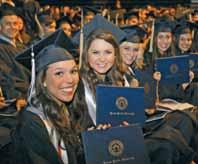
“What dreams has God put on your life as you graduate?” asked Juan Martínez, whose speech, “Dreaming God’s Dream,” was based on Revelation 7:910. “What is your vocation, your unique contribution to our world, our society?” asked Martínez.
Martínez, an ordained Mennonite Brethren pastor, graduate of the MB seminary and professor of Hispanic studies and pastoral leadership at Fuller Theological Seminary, Pasadena, Calif., spoke to about 519 graduates—and in front of some 7,500 family members and friends—in an evening ceremony at Selland Arena in downtown Fresno. Among the graduates were approximately 227 from the traditional program, 194 from bachelor’s degree completion and 98 master’s candidates, including 23 from Fresno Pacific Biblical Seminary.
Like Martínez, most of the graduates grew up in the Central Valley, and Martínez dared hope that many of them would find God’s dream in their home area. “What might God’s dream be for you, in this place, as you envision the tomorrow that God wants you to help build?” he asked. —FPU
The USMB Board of Faith and Life has adopted a document, “A Resource for Churches Dealing with Sexual Misconduct,” which has been made available to all churches in both a hard copy and electronic form. While the document is not a policy and procedure manual, it contains many suggestions for issues to be considered when churches and individuals are dealing with these issues. Churches received the packet in May. —BFL
Tabor College hosted its 105th commencement May 23 in the Student Center Gymnasium, due to the inclement weather forecast. The ceremony was originally to be held at the Joel H. Wiens Football Stadium in Hillsboro, Kan.
An estimated 1,500 family members, friends, alumni, faculty and staff attended the ceremony. The 171 graduates represented six countries and 14 states across the United States, including Kansas.
There were 107 graduates from the Hillsboro campus—the fourth largest graduating class in school history. Tabor College in Wichita and Online had 60 undergraduates and four graduate students who earned master’s degrees. It is the second largest graduating class from the Wichita campus. President Jules Glanzer presented two graduates—Marissa Vix, Reedley, Calif., and Matthew Wiebe, Hillsboro, Kan.—with the Professor Fran Jabara Leadership Award for $1,000 each.
Norman Ewert, an alumnus from Tabor College and professor emeritus from Wheaton College (Ill.), gave the commencement address titled, “Learning from the Unexpected.”
“The primary purpose of a Christian liberal arts education is much more than vocational preparation,” Ewert said. “It’s shaping character, nurturing and developing you as a person, developing a Christian worldview preparing you for life and for eternity.” —TC
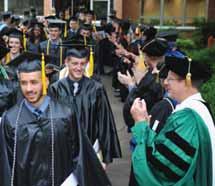
Sept. 9 is the registration deadline for Celebrate 2015, a national conference for USMB builders and boomers Oct. 2-4 at Sheraton Overland Park Hotel in Overland Park, Kan. Interested individuals can register online at http://mbfoundation.com/celebrate2015/, by calling the MB Foundation office at 800551-1547 or by completing the form included in the registration booklet mailed to USMB churches as well as homes. Registration forms are also available from MB Foundation, as is information about travel groups being organized from the West Coast and the Midwest. Some have inquired whether this conference, hosted by MB Foundation, will be a time for the USMB stewardship ministry to sell its services. “No!” says Jon Wiebe, president and CEO of MB Foundation. “We are privileged to host the event and will be present, but this event is about providing a place for you to laugh, cry, worship and grow in your faith walk.”
Father’s Day became an official holiday in 1972, 58 years after Mother’s Day was established.
There are 70 MILLION fathers in the U.S. That’s about 46% of the male population.
Around 16% of single parents are men
Father’s Day spending in 2013 totaled $13.2 BILLION. Special outings, electronics and clothing were the top grossers
Source: About.com, Kathln.com

5 minutes with...

On the day before her 16th birthday, Paige Kauffman, Hesston, Kan., took a moment to share about her new ministry to middle school girls. Last February, “Daughters of the King” held its first event at Hesston MB Church, drawing over 100 fifththrough eighth-grade girls for a day of worship, crafts and inspirational stories designed to help the students deal with issues of self-esteem.


How did “Daughters of the King” come about?
It definitely ties back to the roots of my own personal testimony. In middle school I went through a dark time including a few suicide attempts. I felt very alone.
At a church camp I talked to my counselor. My parents didn’t even know what was happening, but when they found out, they helped me get into counseling.
How did you get the idea for doing an event?
My mom and I were talking about how God can use my experience in a positive way. She suggested a girls’ Bible study. But I love making things huge, so it went from something for a couple of girls at church to an event for girls from 15 middle schools.
Sounds like more than you could do alone.
Our pastors were really supportive from day one and lots of people helped. Girls from our youth group helped lead groups. And a guy from our church made a video with some of the high school guys about how they define beauty and what they look for in a girl.

Your mom or your grandma might tell you that God thinks you are beautiful, but it’s a lot different to hear it from someone closer to your age, someone you might think is cool. It might make you take heart and listen. When I spoke at the event, I put myself out there, telling them what I experienced. When you open up and get personal, you can have an impact.
Total assets managed by MB Foundation (MBF), the U.S. Mennonite Brethren stewardship ministry, increased from $153 million in 2013 to $164 million in 2014. MBF distributed $2.9 million to 254 different charities through 1,673 different distributions in 2014. MBF’s loan portfolio finished the year with a balance of $70 million, a $6 million increase from 2013. The staff size grew to its largest in 24 years of ministry with 14 members and continues to grow as Larry Hodges of Fresno, Calif., was hired April 1 as a planned giving advisor. View the complete 2014 report at mbfoundation.com/2014annualreport/. —MBF

A new book by Katie Funk Wiebe, My Emigrant Father: Jacob J. Funk, 1896-1986, has been released by Kindred Productions and is currently offered at the promotional price of $20. Kindred Productions is the North America MB publishing ministry operated by the Canadian Conference of MB Churches. For more than 60 years Wiebe has written for the church, encouraging and challenging several generations to think more deeply about their faith and to walk more faithfully with God.


The Canadian Conference of MB Churches (CCMBC) has announced that as of December 2015 the denominational magazine, MB Herald, will be replaced by a new print initiative that will be developed with provincial and national ministry partners to rally churches around the mission to “multiply Christ-centered churches to see Canada transformed by the good news of Jesus Christ.” CCMBC additionally announced that due to various financial constraints the Herald—and any subsequent magazine—will be published bimonthly. —CCMBC
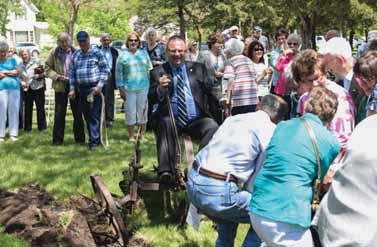
Christian Leader intern Jared Janzen has been awarded the 2015 Evangelical Press Association (EPA) Scholarship. Janzen, a native of Newton, Kansas, will receive a $2,000 scholarship toward his senior year at Tabor College, the Mennonite Brethren school in Hillsboro, Kan. Janzen served as the CL intern for the Spring 2015 semester. He was part of the CL reporting team that attended and reported on the National MB Youth Conference and wrote news stories for CLink, the CL electronic newsletter, as well as CL. He is majoring in communications and English and edits the college newspaper. EPA is a professional association of some 300 Christian print and online publications. —EPA
Volunteers took turns pulling the antique plow used to break ground May 2 for a new arts building at Tabor College, the MB college headquartered in Hillsboro, Kan. The Shari Flaming Center for the Arts will include a performance auditorium, a blackbox theater, a grand lobby, classrooms, a recording studio, choral rehearsal room and a visual arts education wing. The entire project is expected to be completed and dedicated late in 2016. —TC
By Jim Paulus

How to respond when someone tells me about a sexual assault
As we’re sitting in the coffee shop, I can sense the conversation is taking a turn when the person across from me begins to describe a painful event from the past. My companion is fighting emotions now coming to the surface. My own emotions begin to rise: empathy and sadness but also fear, worry and anxiety. How should I respond? Will I make it worse if I say the wrong thing? Why is this person telling me?
Given the opportunity, I like to think most of us are willing to help another person. But how do we respond when the act of serving another is costly, involves things out of our control or leaves us feeling vulnerable and weak?
One of the most difficult situations in which we can be called to serve another is when a victim of sexual violence confides their story in us. Although it is a privilege to be trusted with someone’s story, it can be overwhelming to listen to the aftereffects of a traumatic experience.
The data published on the increase of sexual violence is staggering. The likelihood that we will hear such stories is on the rise. There are a variety of published statistics, but many studies, including those conducted by the Center for Disease Control, report that one in five women is now the victim of sexual violence during her lifetime and even more report sexual harassment.
In my roles in higher education as a counselor and administrator in student development, I have wrestled with how to help victims. If I am honest, there are times when I have wished that students would report to someone else or even not report at all. One can feel helpless listening to a story, and there is pain involved when there are not ways to provide immediate relief.
The field of higher education has been under increased scrutiny regarding how we respond to sexual violence on campuses. Colleges and universities are being held accountable for the culture of campuses, whether or not school officials are aware of violence or should have been aware and how they respond.
An important question being asked is whether or not a campus encourages victims to come forward. In the past, whether intentional or not, some colleges have communicated that they did not want to hear about such wrong doings. It is difficult to hear that your community has not lived up to the expected ideal. It is much easier for others to deal with these painful events. And so some colleges would advise their students to go to law enforcement instead of taking the time to listen and respond to their campus community. Thankfully, campuses are becoming much more open to creating space for survivors of sexual assault to find safe places to report and receive support.
I believe this openness for victims to come forward has and will continue to spread to other areas of our culture, including churches, neighborhoods and places of employment. Following are some helpful reminders for us if we are in a situation where someone shares a story in which they are a victim of sexual harassment and/or violence. These are specifically geared towards situations where the victim is sharing their story for the first time.
Listening, not fixing: The natural response to hearing the pain of another person, especially someone you care
about, is to fix it as quickly as possible. We want their pain to be relieved as soon as possible. This will most likely not be an option, and the urge to fix may create more difficulty for the victim. Often what is needed is someone to be present and willing to listen. If you are like me, it is difficult to be passive and not actively working toward a solution.
Listening, not blaming: When talking with a victim, it is important to choose your words wisely. Being victimized strikes at the core of a person and the retelling of such an episode leaves one exposed and vulnerable. Be very careful of comments, suggestions or questions that could be interpreted as judgmental or laying blame on the victim. Most likely this person has considered if they are to blame. At this stage in the process, it is important that the person listening be supportive and careful with word choices or drawing conclusions.
Giving space: I believe that Christ is the ultimate source of healing in all cases. But when someone initially shares his or her story of sexual violence, it may not be the time to introduce faith. The person may be initially unsure of God’s intention and may question why God did not prevent the violence. Allow the person space to bring God into recovery when they are ready to process the spiritual element of their experience.
Identifying the next step: As I’ve said, it is a privilege to be trusted with the retelling of a scary and painful experience. Getting over the mountain of telling anyone is an important step in the healing process. Oftentimes it will be important to direct the victim to the next step. Depending on the situation and timing, victims will need other support services, such as medical care, counseling or information about legal options. Although we may not be able to “fix” everything for someone, we can be a very important step in that process of getting them to people more trained to intervene.
I encourage us all to promote this topic in our friendship circles and faith communities. I believe one of the ways God looks to display his love and healing is through his people. If we choose to not be comfortable with topics such as sexual violence we are hindering the work God wants to do for those who need him.
Ezekiel 22:30 says: “I looked for someone among them who would build up the wall and stand before me in the gap on behalf of the land so I would not have to destroy it, but I found no one.”
This Scripture paints a challenging but encouraging picture of how God looks for his people to “stand in the gap.” The context of the verse does not address sexual assault specifically, but I believe all followers of Christ can benefit from this concept. Many of us do have gaps in our lives and need healing and wholeness. Christ is the ultimate source of healing, and I believe he is looking for his followers to stand in the gap for others and be a voice of love and hope, even when the subject matter is uncomfortable and overwhelming.
Jim Paulus is vice president for student life at Tabor College, Hillsboro, Kan.
A meditation on Mark 8
We usually think of our gift of sight as one integrated sense. Most of us are able to see what is around us in a very detailed way. We are aware that there are degrees of acuity from how well we can see near and far to whether we can see colors. I have passable but increasingly deteriorating vision, and I have had multiple surgeries, four on my left eye. So I am especially prone to think about the value of sight. There is another aspect of how we see: our brain’s ability to make sense of the images that strike our retinas. Ever since I heard of neurologist Oliver Sacks’ work in The Man Who Mistook His Wife For A Hat (Summit 1995), I knew that there was an intriguing mystery here. What is the process by which we translate light patterns to recognizable details?
The descriptive phrase from science writer Michael Shermer that we are “pattern-seeking, storytelling animals” has furthered my interest. In his review of Robert Wright’s book Nonzero, Shermer says: “We look for and find patterns in our world and in our lives, then weave narratives around those patterns to bring them to life and give them meaning.”
Seeing the “walking trees”
It took me years to realize that, of course, there are biblical passages that most successfully unpack the dimensions of this valuable human ability. While I was discussing the idea of pattern making with some friends, a passage from the Gospels seemed to illuminate the idea perfectly. After Jesus’ feeding of 4,000 in Mark 8, he meets a blind man at Bethsaida. Here is the NRSV translation of the passage (Mark 8:22-26): They came to Bethsaida. Some people brought a blind man to him and begged him to touch him. He took the blind man by the hand and led him out of the village; and when he had put saliva on his eyes and laid his hands on him, he asked him, “Can you see anything?” And the man looked up and said, “I can see people, but they look like trees, walking.” Then Jesus laid his hands on his eyes again; and he looked intently and his sight was restored, and he saw everything clearly. Then he sent him away to his home, saying, “Do not even go into the village.”

I am a huge fan of J.R.R. Tolkien’s fantasy work: When I encounter the “trees walking,” I involuntarily see the Ents of Fangorn Forest. And I believe that this two-stage miracle, unique in the Gospels, conveys even more about how we see, and thus what we see, than I at first realized.
It is easy to use this miracle as a way to explain that there are stages to our progress in the faith—a very orthodox idea. It is worthwhile also to understand that discernment is more than simply immediate impressions. And theologians enjoy discussing issues like whether this man was blind from birth or how this healing fits into the framework of healing miracles in Mark.
However, I find that, for me, this miracle reveals the truth of how and why we are able to see. We first must have the physical ability to perceive light, shape and motion, but we must also have the mental ability to interpret these perceptions.
To understand how our ability to make patterns affects what we see, one need only consider instances of recognition. We all have had the experience of seeing an interesting looking person coming around a corner, only in that same moment to realize it is our spouse. Or imagine what we would make of a car if we did not have context for it.
A fascinating illustration from my area of study is Odysseus and the winnowing fan. Since Poseidon still has a grudge against Odysseus after his return to Ithaca, we are told that the god of the sea requires Odysseus to take an oar and walk inland until he comes to a people who will mistake the oar for a winnowing fan. There he is to build a temple. Odysseus travels far to find people who have no pattern into which to fit the idea of an oar.
There is also an analogy to the two stages of vision in how we learn difficult material. In languages, narratives, physical evidence, etc., bright people can learn
By W. Marshall Johnston
When I see a student with a complaint, I can see someone with real concerns and aspirations, or I can see an unwanted interruption.
the best methods and the application of those methods, but it is often a great challenge to do both in sequence. This difficulty seems to occur in contexts ranging from recognizing founderpatterns in Roman history to teasing out subjunctive phrases in Latin. Passages may look like “trees walking” even to very bright students, unless we use our full measure of clearer sight.
Even with the gift of real sight we, being fallen creatures, do not have flawless discernment. We can see dangerous patterns and hazy conspiracies as well as the work of God and his creation that he has put in our care. Our sight can be a blessing or a curse as we choose to use it. When I see a student with a complaint, I can see someone with real concerns and aspirations, or I can see an unwanted interruption. More importantly, when we see a person of another ethnicity in an unexpected place, we can see a possibly dangerous encounter or a child of God.
The surrounding context of this passage in Mark is an eloquent expression of these two parts to our sight. Before the above passage Jesus deals with the physical needs of his people (feeding the 4,000), and afterward conveys his transcendent identity. Just as his saliva is taken from that part of him that is fully man, Jesus sees to the sustenance of his followers. After the miracle, he challenges his followers to identify who he is. Peter alone understands that Jesus is the Messiah. Jesus is the Savior who with his hands can grant that gift that allows not just sight but insight—and, if we listen to the still, small voice, he provides wisdom.
We can see that we need a savior, but it is easy to understand why that vision sometimes leads people to a solution such as Jim Jones or David Koresh. Simple answers can appeal more than the realization that our mortal journey provides a “dark glass” (in Paul and Augustine’s term), as this world can appear to us. Our desire to have clarity, rather than to undertake the complexities of kingdom-service, does not often go so far astray as these pernicious figures, but we must be on guard. It has been my privilege to serve at a Mennonite Brethren school this last decade and to learn better discernment through listening, reflecting and seeing in community.
W. Marshall Johnston is associate professor of history at Fresno Pacific University where he teaches ancient history and classics in the School of Humanities, Religion and Social Science.



By Karen Neufeld

My husband and I joined the many hands of blessing that surrounded our daughter. She had recently received the unanimous support of her congregation for a second, three-year term as solo pastor. How did we arrive at that moment?
We are fourth generation Mennonite Brethren. Our daughter was raised in a Mennonite Brethren church. She graduated with a Master of Divinity from our Mennonite Brethren seminary in Fresno. The U.S. Conference of MB Churches (USMB) does not permit women to serve as lead or solo pastors.
Our daughter, an only child, was born after 20 years of marriage. I identified with women in the Bible who waited for a child—Sarah, Rachel, Hannah, Elizabeth. I had a deep sense that this child was intended for a special purpose. But she didn’t show early gifts commonly associated with leadership. She was shy. She hid behind my skirts when meeting strangers. She remained quiet among boisterous children. She didn’t do motions with gospel songs or enjoy playacting in Christmas programs.
More subtle gifts emerged—gifts of listening, sensing emotions and empathizing with others. She demonstrated an amazing ability with language. She recited the entire story of Cinderella at age 2 1/2. She used grown-up language in unique ways. In the safety of home, she asked probing questions and responded insightfully to classic literature and Bible stories.
Gradually her shyness matured into a quiet strength. She made loyal friends, sang in a community children’s choir, performed piano solos and earned academic honors. She chose to attend a Mennonite college miles from the security of home.

What would she do with her life? Her dad encouraged her to take practical courses—accounting, computer science. I encouraged her to explore a career in library science. Her interests drew her toward a history major with an Anabaptist studies minor.
During the summer of her junior year, our church invited her to serve as an intern. She would organize events, make pastoral visits and preach one sermon. As the summer passed, people began sharing things about our daughter: “She has such a sense of what needs to be done.” “Her visits mean so much to me.”
As the Sunday of her sermon approached, she appeared calmer than either her dad or I. She didn’t want our help. We heard her practicing in her room. During the actual sermon delivery, I was mesmerized. She had an engaging and sincere presence. Her message was biblically based, thought provoking and challenging. Was it just me? At the end of the service, affirming members of the congregation surrounded her.
But after college, the question remained: What would she do with her life? She applied for an office job and an archive position with Mennonite Central Committee. Neither materialized. She was accepted to graduate school in library science but wasn’t drawn toward the program of study. She began teaching piano lessons and assisting an elderly couple in their home.
Gaining experience, affirmed gifts
To explore other possibilities, she enrolled in a course at our nearby MB Biblical Seminary, now

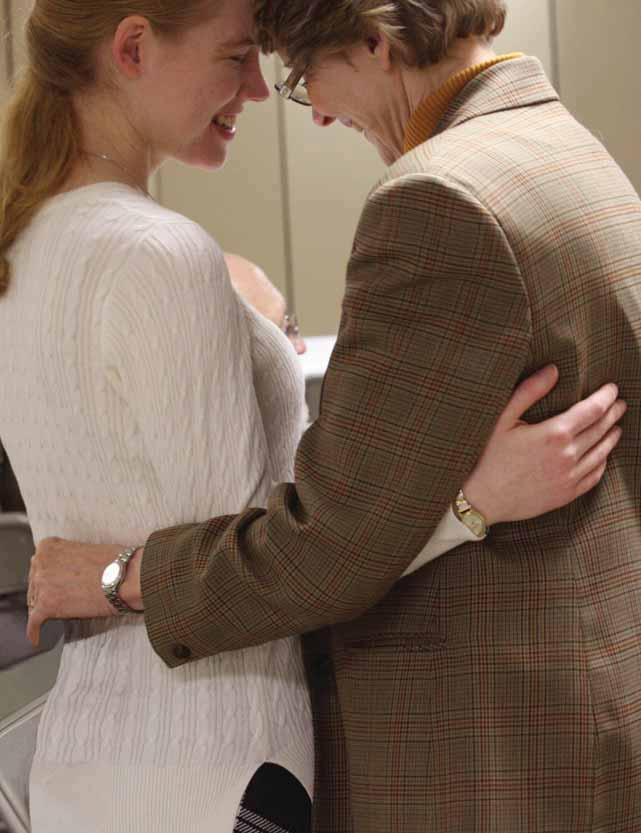

Fresno Pacific Biblical Seminary. The course ignited her passion for biblical study and ministry. She applied to the seminary as a full-time student in its master of divinity program. I worried about where the program would lead. I knew USMB limited women to supporting pastoral roles. She didn’t demonstrate the bubbly charisma of a children’s pastor or the casual style of a youth pastor.
While studying at the seminary, people witnessed and affirmed her gifts as she gained experience. She preached for vacationing pastors at local churches and occasionally led worship and preached for our home congregation. She completed a supervised ministry requirement with a church in a nearby community. The church was so appreciative of her gifts that it created a position for her as part-time chaplain at its retirement center.
After completing her master of divinity degree, she looked for a full-time ministry position. Facing limited options in USMB churches, she filled out an online questionnaire and posted her resume
USMB churches send girls to Ministry Quest, prepare women in our seminaries, bless women for international ministry and employ women in supporting church roles. Mennonite Brethren conferences in Canada, Africa, India and South America permit women to serve as solo pastors. Why do we as USMB churches close ourselves off to the possibility of a woman serving as a solo or lead pastor?
Our daughter did not force herself into the hearts of her congregation. Her church simply recognized her gifts as fitting its needs. What gifts lie dormant among women of our USMB churches? Who has left us to serve elsewhere? In the 1980s and 90s the U.S. Conference periodically addressed the role of women in the church. We have remained strangely silent since.
I am aware of interpretations of biblical passages that make male gender an absolute requirement for pastoral leadership. I am also aware of interpretations that put gender in an historical and cultural context and elevate discernment of gifts as the de-

My experience as the mother of a pastor convinces me that we must observe the beauty of what God can do through women.
with Mennonite Church USA. She received calls from district ministers, then a series of interviews with a search committee. The interviews were followed by an invitation to candidate for a position as solo pastor of a Mennonite church in Kansas. In January of 2012, she accepted the church’s call to be its pastor. The following May we delivered her to her new church family.
Do we believe God prepared our daughter for her role? Yes—from the development of her gifts to the unfolding of her life. We are witnesses to a union between God’s provision for leadership and congregational needs. In the words of her congregation: “She is God’s gift to us.” “She is wise and mature beyond her years.” “We look forward to every sermon.”
termining factor. I’m convinced that arguing the biblical passages won’t lead to resolution.
My experience as the mother of a pastor convinces me that we must observe the beauty of what God can do through women. I believe it is time to revisit the reality that God has gifted us with women who stand ready to serve God and the church in a full range of leadership roles, including that of solo or lead pastor.
Karen Neufeld is a professor emeritus of Fresno Pacific University. She and her husband, Lorin, are members of the College Community Church MB in Clovis, Calif. Her daughter, Laura Neufeld Goerzen, is pastor of First Mennonite Church of Christian in Moundridge, Kan. Photo, page 15: Karen and her daughter. Photo by Vada Snider.
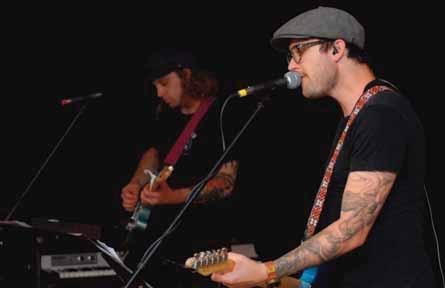
At Axiom Church, music is more than a catalyst for worship; it’s also an important tool for outreach and discipleship for this young congregation.
Axiom is a USMB church plant in the Phoenix, Ariz., area, that is supported by Mission USA, the Pacific District Conference (PDC) and Copper Hills Church, Phoenix, and officially launched in January 2013. From the beginning, the church has had a vision for reaching the “unlikelies” in their community.
“Jesus was often found hanging out with people you wouldn’t have likely found in the synagogues,” says the Axiom website. “We too have a heart for these kinds of people.”
Music creates “culture of worship”
Perhaps because several core leaders have toured professionally—including brothers Gavin Linderman, pastor, and Lance Linderman, director of outreach, as well as Micah Bentley, director of music and worship—Axiom seems to draw those who are passionate about music and are involved in the music scene.
As the website says, “Often we joke that our church is made up of musicians and baristas. While that’s not totally true, you will find yourself meeting people who typically you are unlikely to find in the church of the burbs.”
So it’s not surprising that music plays an important part in the expression of worship, mission and discipleship at Axiom.
Music—often original music—helps create a “culture of worship” at Axiom. “Our whole lives can be expressions of worship,” says director of worship Bentley, “but music is often the starting point for that.”
When Axiom leaders recently wanted to encourage attendees to interact more deeply with a teaching series, they naturally turned to music. “Novus,” an extended play (EP) recording of original worship music, was released on Easter and designed to dovetail with a series on spiritual formation. CDs were handed out to all attendees as part of the Easter Sunday celebration as “something they can take into their life,” says Bentley.
Axiom Church has adopted the term “musicianaries” to describe music as an outlet for mission. “It’s been a great language to use for us and our musicians,” says Micah Bentley, director of music and worship (pictured.) “We’re on a mission when we’re playing music, whether it’s worship music or our art out in the community.”
Music has become a key way Axiom reaches out in their community as well, beginning with the very space in which they meet. The renovated storefront facility is intended not only for worship but also as a multi-purpose venue for community gatherings and concerts.
As Axiom offers their venue to local and touring musicians, they show Christ’s love to the people whom Axiom has a vision to reach. “A vast majority of the music culture is what you might consider unlikely to be drawn toward the church or toward God,” Bentley says.
When a band books the venue, Axiom does more than unlock the doors. Volunteers help carry gear, set up top-quality sound, provide food and host musicians in their homes. “We take them to the stage and give them a voice, then take them to our homes and give them a shower,” says Lance Linderman, director of outreach.
That’s no small gift, he notes, speaking from personal experience. When musicians are living out of a van, haven’t showered in days and are making little or no money, “this place is like a city on a hill,” he says. “When they leave the show, they’ve been hugged and loved.”
The musicians Axiom hosts aren’t necessarily Christian. Linderman says that at first, he wrestled with wanting to “be cool,” tempted to minimize the fact that the venue is also a worship center. Now, he says, he is more up-front about the church and his own faith, which opens up “weird and interesting” conversations.
Reaching the “unlikelies”
Linderman points to the example of Jesus, who ate with tax collectors and sinners. Linderman says, “I can’t think of a better way to reach unlikelies.”
A few of the musicians they’ve served in this way have become part of the Axiom congregation, moving from what Linderman calls “complete depravity” to baptism. And Linderman notes that for every concert, he’s been able to connect further by swapping phone numbers or engaging in conversation over coffee.
Linderman believes that hosting musicians is also a discipleship opportunity for those in the Axiom congregation as they put feet to Jesus’ command to love others. “The greatest way we can disciple people is by allowing them to tangibly touch and be a part of heaven coming to earth, heaven coming to Axiom, heaven coming to that band,” he says. “When they get to be that, they are doing the will of God. Creating opportunities is a huge way to disciple people.”
Music and mission also intersect at Axiom through Wild Earth, an artistic project led by Bentley. In fact, Wild Earth thinks of themselves as “musicianaries,” musicians who see art as a mission. The term is adopted from Come&Live!, (comeandlive.com) an online community of Christian musicians.
Bentley explains: “We’re on mission when we’re playing music, whether it’s worship music or our art out in our community.”
Bentley had been doing music both on stage and in worship settings for about 10 years when he felt a pull toward original worship music. He says that Gavin Linderman, pastor at Axiom, helped him refine that dream, and the congregation as a whole championed Wild Earth from the beginning. Consequently, the lines between this independent project and Axiom are blurred.
Axiom supports band
Rather than a set “band,” Wild Earth is comprised of a rotating cast of musicians, many of whom are part of Axiom. Sometimes Wild Earth leads worship at Axiom, playing original music with an indie rock vibe. When Wild Earth dreamed of releasing an album, Axiom people supported the project’s crowdfunding efforts. And when the band released a full-length album in January, Axiom hosted the release concert in their venue.
“Axiom was behind me every step of the way and continues to be now,” Bentley says. Wild Earth’s album, Orchestrate, is available for free download on the Come&Live! website.
Linderman says Axiom considers Wild Earth one of the church’s missionaries. “We’re recognizing that God is moving,” he says. “We want to support them.”
Music will undoubtedly play a role in Axiom’s future. Bentley says more original music is in store, and he dreams of Axiom being “a hub of music culture” in the Phoenix area, especially through the venue. Linderman likewise hopes Axiom’s influence would expand. He suggests the venue may find a “sweet spot” among younger musicians— those below drinking age—since the venue doesn’t include a bar.
Both Bentley and Linderman welcome conversation about their music and mission. Linderman readily admits the congregation is still learning, and he welcomes counsel from the larger USMB family. Bentley would welcome conversation from other USMB congregations interested in using music in new ways. They may be contacted through Axiom Church: office@axiomchurch.co. —Myra Holmes
For many kids, summer camp is a way to have fun in the great outdoors by swimming, hiking and roasting marshmallows over bonfires. But for children and adults at Russian Baptist Church, a USMB congregation in Shakopee, Minn., camping is much more. It’s an opportunity to build community and learn about God, which is why the church owns Eagle Lake Camp and Retreat Center.
This summer marks the third year since the church purchased Eagle Lake Camp, a 120-acre campground situated around a private lake about 130 miles north of Shakopee. The purpose of the camp is to develop and encourage ministry groups in the congregation, says Victor Gromoff, a board member of Russian Baptist Church.
“It’s mostly for promoting relationships with church members and building up the community at the church,” says Gromoff.
Owning camp expands options
In the summer, the church uses the campground for a number of kids’ camps. They also hold a variety of weekend retreats designed for specific groups, such as fathers and sons, mothers and daughters, married couples, older adults and the church’s choir. These retreats focus on building relationships within families and within the congregation.
Before the church purchased Eagle Lake Camp in the spring of 2013, it rented sites at national parks to hold camps. Having its own site has expanded the church’s options for holding camps and retreats.
The first year at Eagle Lake Camp, all kids and teens were in one camp for a total of about 350 people, including volunteers. Now kids ranging in age from six to 15 are split into three separate back-to-back camps in the first half of July, each one lasting five days.
A typical day for the campers begins at the crack of dawn with 5 a.m. fishing excursions on the lake. Then, typical of Russian culture, the kids gather for 15 minutes of aerobic activity before breakfast, including stretching, jumping jacks and running laps.
They then have a morning Bible study for about an hour, followed by an activity time with different checkpoint games based on the day’s topic or the theme of the camp. After lunch is
more free time for activities like soccer, volleyball, inflatables, swimming, boat rides and tube rides. A new addition this summer is banana boat rides.
The evening is dedicated to a two-hour program based on the theme of the camp. This time includes singing, reciting Bible verses, skits, puppet shows and a message from a speaker. The lessons focus on important concepts, such as the consequences of sin and the identity of God and Jesus.
On the last night of the camp, the kids grab flashlights and walk to a remote setting where the volunteers perform a play—focusing on stories from the life of Daniel or Joseph, for example—that emphasize the week’s theme.
Eagle Lake Camp welcomes kids outside Russian Baptist Church who hear about the camp through the city’s Russian school.
“More and more, we have kids who come from other Russian churches in the Twin Cities or from families of nonbelievers that are Russian,” says Andrey Tabakov, a volunteer at Eagle Lake.
The different retreats the church holds allow all ages within the congregation to enjoy the campground and benefit from the ministries it provides.
“We see that these groups that we have established are absolutely needed,” says Tabakov concerning the retreats for specific groups. “For future years we try to polish

these programs for different groups so that they are more helpful, and that they have more long-lasting effects.”
The couples’ retreat is one that Tabakov has done with his wife the past two summers. The first year, a speaker from the Ukraine who works with family ministries, spoke about personality types.
“For me personally, that opened my eyes to who my wife is,” says Tabakov, who has been married for almost nine years now. He added that the seminar helped him understand why he and his wife might react in different ways.
Many of the speakers give their time on a volunteer basis rather than for payment, but depending on who they are and where they come from, the church may pay for the speaker’s travel or make a donation to the speaker’s organization. In the past, the camp has invited speakers from Russia, Ukraine and Moldova as well as from within the U.S. While most speakers prefer presenting in Russian, some will give their message in English.
The church’s summer camps and retreats are free, and they do not charge outside groups that use the camp facilities. During summer months, the church sets aside one weekend each month for the camp to be used by outside groups, with more availability for such purposes in other seasons.
Russian Baptist Church uses the campground in the other seasons too, but less heavily. Within the past year, they’ve built a sauna to use for the programs during the snowy weeks of December.
The sauna is just one of many additions and renovations they’ve made to Eagle Lake Camp, which was built in the late 60s and early 70s. They’ve converted the kitchen space to be usable year-round, reshingled some buildings and generally made sure the camp was in good condition.
“In our culture overall people just like to get together and make things happen, and so we constantly improve,” says Tabakov.
Tabakov is one of the 70 to 80 volunteers who make camp operations possible. He volunteers at the camp in a number of capacities that include setting up audio and visual components around the camp, leading hiking trips through the surrounding woods and giving boat rides around the lake. Last summer he volunteered at the camp every weekend except two.
In the past 20 years, Russian Baptist Church has grown exponentially from 60 members to 750 members due to a wave of immigration that has since slowed, says Tabakov.
Russian Baptist Church joined USMB about 10 or 12 years ago, according to Roger Engbrecht, Central District Conference minister for ethnic ministries. Although the church has Baptist in its name, in Russian culture this has a different meaning than it usually does in the U.S. For Russians, the word “Baptist” is similar to the way U.S. Christians use the word “evangelical.”
The camp used to put more emphasis on maintaining the Russian culture of their youth, according to Tabakov, but now the camp’s focus has shifted away from culture to teaching their youth to be ethical followers of God.
“The main focus is building the relationship within families, building their relationships with God,” says Tabakov. —Jared Janzen
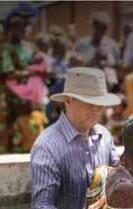
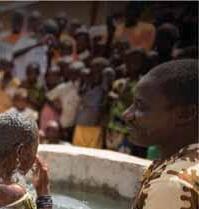


Divorce was a dark time for Sara Anderson. Though she and her children were seeing a professional counselor to help them cope in a healthy way, she felt she needed more. So she sought help through Stephen Ministries (www.stephenministries.org), a Christian caregiving ministry founded in 1975.
Anderson was paired with a trained Stephen Minister, a member of a local church who met with her weekly to listen and lend support. Her Stephen Minister didn’t judge, try to solve her problems or tell her what to do; she just walked alongside Anderson. Sometimes, that meant sitting together in silence. Often, it meant praying together.
“She shined a light of Christ into my life,” Anderson says.
Anderson now attends Lincoln Hills Bible Church, Sioux Falls, SD, one of two USMB congregations that have found Stephen Ministry to be a helpful resource for meeting needs in their congregation and community.
The gift of listening
Despite increasing connectedness through technology, people need the simple gift of a listening ear more than ever. “I think it is rare to feel truly heard,” says Tony Randall, pastor of Lincoln Hills.
It was the awareness of that need that prompted Randall to explore Stephen Ministry for Lincoln
Hills. The congregation has been a Stephen Ministry congregation for about a year and a half. There are now six trained Stephen Ministers—lay caregivers—at Lincoln Hills, and each has been matched at least once with a “care receiver.”
Fairview (Okla.) MB Church has been a Stephen Ministry congregation for much longer—about 10 years—and currently has 12 trained Stephen Ministers. Just like at Lincoln Hills, a felt need prompted Fairview to explore this lay caregiving ministry.
Nicole Martens, who is both a leader of Stephen Ministry at Fairview and a licensed counselor, says that options for care in their rural community are limited. So those in need often turn to the pastors, who simply can’t do it all. “There’s a lot of care that needs to be provided,” she says.
Caring ministry requires commitment
Both Randall and Martens agree that becoming a Stephen Ministry congregation is a substantial commitment. First, the congregation must enroll, a onetime step that comes with a one-time enrollment fee. Then the congregation sends chosen Stephen Leaders to a weeklong course, which equips them to oversee the ministry, train Stephen Ministers and connect those trained caregivers with care receivers.
The Stephen Ministers make a significant commitment as well, starting with 50 hours of intense training. Then they commit to two years of availability as a caregiver, with regular meetings for ongoing supervision, training and support.
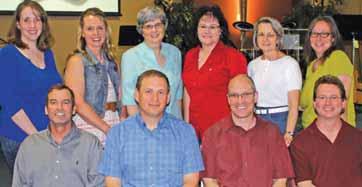
Pauline Schroeder, one of the Stephen Ministers at Lincoln Hills, says that saying yes to such a commitment was not easy. “I fought it,” she admits. But the training equipped her well, and she believes God supplies what she lacks. “I have sensed his presence with me every time I go out the door to meet with my care receiver.”
Care receivers might be members of the congregation or the wider commu-
nity. They are ordinary people facing common issues like chronic illness, job loss, grief, divorce or new parenthood, to name a few.
“Most of us do just fine handling our own problems,” says Randall. “For many, the problems are a little bit more difficult, to where they would probably make it on their own, but they’re going to make it a lot better with a Stephen Minister.”
This lay caregiving is not designed to tackle clinical issues, like depression or mental illness. For those more serious issues, Stephen Leaders and Stephen Ministers evaluate and recommend appropriate care.
Nor is Stephen Ministry designed to solve problems. “Sometimes people don’t want to be fixed,” says Randall. Rather, caregivers come alongside and listen. “More than anything, Stephen Ministers are good listeners,” he says.
While Stephen Ministers work with both Christians and nonChristians, the care is clearly Christ-centered. The parent organization is a Christian ministry, and the training and materials are focused on Christ and on biblical principles. “Basically everything we go through is focused on Christ,” Martens says. Because of their willingness to make the necessary commitment, Stephen Ministry has proven a valuable resource at Lincoln Hills and Fairview. The most obvious benefit is to the care receivers.
One woman who received care through Stephen Ministry at Fairview says the caregiving allowed her to “think through some of the issues and stressful circumstances in my life.” She met with her Stephen Minister every other week to “talk and vent” as she was going through a stressful season as
a stay-at-home mom. “I am grateful for the people in our church who have gone through many hours of training to minister to people in our community and congregation,” she says.
Another benefit of Stephen Ministry is that it enables a congregation to empower those with caring gifts. “Most congregations have people attending with the spiritual gift of care,” Martens says. “That’s what they do and do it well. To not utilize that is a waste, a shame. You can really give them the support and the training they need to enhance the spiritual gift they have.”
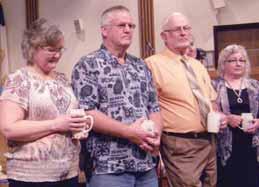
Schroeder, of Lincoln Hills, is one who has been empowered. She says she has always been one to listen and meet people on a deeper level. The Stephen Ministry training has merely helped her “fine-tune that desire.”
Anderson, who found Stephen Ministry so helpful during her divorce, says that even though adding Stephen Ministries to a church’s ministry is a big commitment, if a congregation can effectively care for those in its church and community, “you will have helped spread the kingdom of God. And that’s what it’s all about.”—Myra Holmes

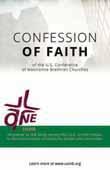

■ Planting NEW CHURCHES
■ Providing EVER EXPANDING IMPACT
■ Resulting in TRANSFORMED LIVES

Plentiful gardens, laden trees and blooming flowers abound in summer.
Please pray for our church planters as they seek the fruit of transformed lives.






Don Morris Mission USA director
Many of the old, huge maples and oaks in my son’s Kansas City, Mo., neighborhood are 60 to 70 feet high and provide a magnificent green, leafy canopy above lush green lawns. One morning I sat at a large window and gazed out at the beautiful backyard.
At first I didn’t see much, but as I relaxed and really looked, I began to notice an orchestra of activity. I started to count the squirrels running around and soon had numbered a dozen of the inquisitive furry creatures. Some were running up and down the expansive tree trunks, others were skittering across the top of the wood fence and several ran up onto the back porch, oblivious that I was standing there watching them through the glass just two or three feet away. Some squirrels were content doing their own thing; others were busy chasing each other in fun.
Then I began to see other creatures, like the huge robin that bounced around the lawn looking for worms. Since it had rained a lot, there seemed to be an abundance of worms near the surface and the robin was doing quite well with his breakfast until a large blackbird came swooping down to chase the robin from, what I gathered, the other bird considered “his domain.” The robin left for just a moment, until the blackbird had gone, and then flew back and resumed his feast in the grass.
As I looked high in the upper branches of the gigantic trees, I spied smaller birds flitting here and there with seemingly little purpose. Watching further, I saw that way up there were large clusters of

small flying insects. So these little birds were having their own breakfast feast—it was just a different meal selection than that of the robin.
Suddenly two red-winged blackbirds came from the right and flew hard and fast to the left. It was then I figured out that one was quite impolitely chasing the other out of the area. They flew down the block in this pattern, evidently the one in charge making sure the other knew not to come back.
Ah, territorialism!
Then I saw a lime-green lump—a frog! Where did he come from and why hadn’t I noticed him before? He was rather large for a frog. Even though I didn’t witness any bug catching, I supposed he was there to catch the unfortunate grasshopper that got in his path. He didn’t hop around much, certainly not like the robin; maybe that’s why I hadn’t seen him.
This backyard scene was intriguing. There was so much happening once you really saw. Then it struck me. This is much like what Jesus expects to see when he watches his church. He doesn’t expect all of us to do the same thing or to be birds when we are really frogs. We are called to simply use the specific gifts that God has given to us.
If we just look at the whole of our community, we might not see what we need to see. We might get discouraged and think, “How can we cover all of the needs here?” But if I do my part and you do your part, the sum effect is a wonderful mix of just the right things to make it something truly wonderful.
Anew Mennonite Brethren church, led by church planter Boris Borisov and his wife, Julia, has emerged in Spokane, Wash. Pacific Keep Church is a daughter church of Pilgrim Slavic MB Church, Spokane, and is being planted in partnership with the Pacific District Conference (PDC) and Mission USA (USMB). The fledgling church is holding regular Sunday gatherings for the core team that now numbers 40 people. A public launch is scheduled for September 2015.
Pacific Keep Church arose out of a Sunday evening worship gathering geared for 20- and 30-somethings, young adults who either were connected with Pilgrim Slavic MB Church or who knew the Borisovs. This gathering developed into an enthusiastic and committed core of English-speaking young adults who wanted to “do church” in English and with a contemporary style.
Don Morris, USMB interim executive director, recently attended a core group Sunday worship gathering. “The worship was fantastic, the preaching was spot-on and the atmosphere was very engaging,” Morris says. “This is very exciting to be a part of.”
“Pacific” refers to the geographical area. “Keep” is a reminder that God is faithful to keep his children, undergirding and supplying—a fortress of refuge and strength.
The church is dedicated to reaching disenfranchised and irreligious young adults in the greater Spokane Valley. While many Slavic-heritage young adults have been and will be drawn to this contemporary ministry, there is high expectation that young people of all cultural backgrounds will be attracted to Pacific Keep’s fresh ministry focus.
Borisov writes in the church’s vision document, “Many 20-somethings skip out on the church community and therefore the body of Christ. Many may have discounted the gospel as it has been presented through a cultural spectrum that isn’t well contextualized to today’s reality. Speaking to many of these individuals reveals that they don’t have an issue believing in God; they just don’t see
how they can be in the current church. We want to change that.”
In addition to the PDC and Mission USA, the church is also being supported by the Life Center, a large independent church in Spokane. A Life Center staff member as well as a professor from Whitworth University in Spokane who is well acquainted with the Borisovs will also serve on the Pacific Keep project team.
Borisov is serving bi-vocationally as he also works for the City of Spokane as a city planner. Boris has significant theological education, and he and Julia have had a strong calling to ministry for some time. In addition to the Borisovs, Andrey Muzychenko is significantly involved as the church’s administrative director.
Gary Wall, Pacific District Conference minister, says, “As we have envisioned ministry to this next generation of Slavics, the kind of ministry that Pacific Keep Church brings to the table is exactly what we dreamed about.”—
Mission USA news story
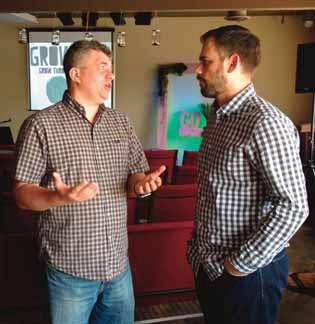

Many of us are aware that Internet pornography is a growing threat to our families. But sadly, many Christians are hesitant to talk openly about this problem, and many myths persist about it. Here is the truth about five of the most common myths I hear among Christians regarding pornography.
Myth #1: Porn pop-up ads are normal. When parents who have porn pop-ups on their computers mention it to friends, they hear, “Oh yeah, that happened to me too. Hackers do that stuff. It’s normal.”
Truth: Files accidentally downloaded while browsing pornographic websites activate pop-up ads. It is exceedingly rare for a pornographic pop-up ad to appear without your computer having accessed porn. If your computer has such an ad, it’s a safe bet someone used it to view porn.
Myth #2: Marriage is a solution to pornography addiction. Many young men have misunderstood 1 Corinthians 7:36 as suggesting that marriage is an easy fix for a lust problem.
Truth: Pornography affects your brain differently than real sex. With pornography, you get what you want, when you want it, how you want it. You train your brain to associate sexual pleasure with self-gratification, and the simple fact is that real sex with the woman you love won’t produce the same kind of satisfaction you have trained your brain to crave.
Myth #3: Porn is a teenage and young adult problem.
Truth: Numerous studies reveal that many kids have their first exposure to pornography before 12 years of age. One example is Elizabeth M. Morgan’s study, “Association between young adults’ use of sexually explicit materials and their sexual preferences, behaviors, and satisfaction,” published in 2011 in the Journal of Sex Research. However, we need to be aware that these studies are addressing “x-rated” pornography. Children are typically exposed to “soft-core” pornography every time
they pass a magazine rack. Rest assured that your eight-year-old has taken note of the raunchy poses and captions plastered on magazines at the grocery store. Such pictures and captions can ignite your youngster’s curiosity, which leads us to the fourth myth.
Myth #4: My child is too young to look at porn.
Truth: Kids may think kissing is gross, but they are still curious about the great mystery of sex. Children learn from a very young age that the answer to nearly every question is available on the Internet. Once they are smart enough to sound out easy four-letter words, they can “Google” new vocabulary any time. Sadly, if you put a random “dirty” word into a search engine, the top results will be pornographic.
Myth #5: Accountability software doesn’t really work. Several quality accountability programs exist which record Internet activity and report it to a third party. Sadly, they get a bad rap from people who think simply downloading a program is the end of their struggle with pornography addiction.
Truth: Accountability software only works when you put work into it! If you want to use such software to protect your family, you have to do your homework. When you get the activity reports, look over them and ask questions. If you are personally struggling, then choose an accountability partner who is willing to really hold you accountable.

Internet pornography is a growing problem, and we have good reasons to fear it. But God doesn’t call us to fear. He calls us to action. It takes effort to protect our families and ourselves, and when we do the work, future generations will benefit greatly.
Dan Copeland, a member of Bethesda Church in Huron, SD, teaches Bible at James Valley Christian School, a private high school in Huron, and hosts stopthepornpandemic.com. He is a graduate of Sangre de Cristo Seminary, Westcliffe, Colo., and served as a youth pastor for four years before being called to Christian education.

Kathryn Glanzer
“When you come to the end of yourself, that’s when something else can begin.” – Kara Tippetts
Ifound author Kara Tippetts through a friend. I began by reading her blog, Mundane Faithfulness, and eventually met her book, The Hardest Peace. Tippetts began writing when she had come to the end of herself.
In the midst of stage IV cancer, as a mother of four and wife of a church planter, she embraced her brokenness and wrote her story, communicating the fullness of God’s grace. As a reader, I watched Tippetts go through redefining what is beautiful and what is to God’s glory as she chooses to “humbly receive the story no one would ever want, and know there is goodness in the midst of its horror.” Make no mistake, this is a hard book to read; it forces the reader to consider his/her own story. After all, “We are not the author of our story,” writes Tippetts. “We are the characters.” We are here to glorify God.
Tippetts lays herself out before her readers as a dying and broken woman who struggles with her journey. She explains that, “Before cancer, I would have said I was on the journey of seeking grace, but in truth I was manufacturing my own faith.” Her book takes readers through her battle with preconceived concepts of faith, grace and beauty as she battles cancer and finds new definitions along the way. While I was reading The Hardest Peace, Tippetts passed away; she died in March 2015.
A dear friend of mine is the church secretary for the young Presbyterian Church of America church
the Tippetts planted in Colorado Springs, Colo. During this past year, I loved praying for Kara alongside her congregation, but I have especially treasured hearing the side stories of how this congregation has moved and swayed together with the Holy Spirit at the helm.
What a journey they have endured together with their pastoral family: raw and communal. Tippett herself describes it: “Our church became a place to show up needy. We had to let go of our false comforts found in control and strength. We said yes to offers of care and help. We stopped pretending we had anything figured out.” Haven’t we all hungered for this kind of awareness of grace and the freedom to be broken amidst our church bodies?
In the end, Tippetts’ story is not one of miraculous physical healing but of spiritual and corporate healing. After all, God walks with her though the valley of the shadow of death and does not save her for this world. Her story promotes another focus: eternal preparation. It is about “finding ourselves restored in the midst of our brokenness,” writes Tippetts. It is about finding healing and wholeness through our recognition of being incapable without God.
As a Christian, I subconsciously and sometimes consciously work toward being stronger. Tippetts’ writing prompts me to question if I allow God’s grace to be sufficient for me and if I am allowing his power to be made perfect in my weakest moments. It is risky to allow God to be the author of my story. Risky, raw and restoring.
Kathryn Glanzer is a member of Ebenfeld MB Church, Hillsboro, Kan.

“Empathy games” is a growing genre in the video game industry. In these games, players don’t attain goals or overcome obstacles as much as empathize with characters on a significant life journey, reports Christianity Today Josh Larson and Ryan Green are two Christians developing That Dragon, Cancer, a game that conveys Green’s experience raising his son, Joel, who died of cancer last year at age five. The creators have launched a Kickstarter campaign to fund their project and anticipate


Kalen Moss, Sam Moss, Tucker Moss, Colton Olsen and Tara Proffitt were baptized May 17 and received as members of Ebenfeld MB Church, Hillsboro, Kan. Chris Acker and Nickie Miller were received as members.
Victor Bedford, Joan Darrow and Tiffany Gurule were baptized April 5 and received as members of Garden Park Church, Denver, Colo.
Velma Mulligan was received March 29 as a member of Shafter (Calif.) MB Church
Terry McWhirter, Allison McWhirter, Sylvia Young, Laura Phillips, Jonathon Reid and Luke Neazor were baptized May 3 at Kingwood Bible Church, Salem, Ore
Linda Bornmann was received as a member of Henderson (Neb.) MB Church March 29.
Rita Bishop and Mark Fletcher were baptized March 29 and received as members of Enid (Okla.) MB Church Brett and Keli Dailey, Jon and Brandi Hejl, Thomas and Jaclyn Holland, Bekah Hood, Ghent and Jil Hopkins, Adina Long, Nate and Amber Mocalis, Justin Parr, Doug and Amy Ratzlaff and Rebecca Unruh were also received as members.
Joshua Saenz was baptized May 3 at Parkview MB Church, Hillsboro, Kan
Rinda Amstutz and Bailey Kaufman were baptized March 22 at Hillsboro (Kan.) MB Church.
Delilah Ayers, Ashley Bathauer, Sarah Friesen, Josh Friesen, Hannah Friesen, Thomas Kawagoe, Malissa Lackey, Kallie Huebert, Alyssa Regier, Andrew Sorensen, Sarah Specht and Morgan Thonesen were baptized April 12 and received as members of Reedley (Calif.) MB Church. Luke Bese, Mark and Lisha Merritt, Samantha Specht, Greg and Hannah Thonesen and Peter and Kathie Woelper were also received as members.
David Dueck and Tyler Schlesselman were baptized April 5 at North Fresno (Calif.) Church
Eight people were baptized April 12 at a joint service of Grace Point @ Grulla (Texas) and Grace Point @McAllen (Texas): Isaac Gutierrez, Jose Alberto Zuniga, Julissa Reyna, Jacob Aaron Vera, Edwin Alexsander Garcia, Illiana Castillo, Kiara Lee Zarate and Irma Patricia De Leon.
Emilie Kemp and Christina Pembrook were baptized April 5 and received as members of Fairview (Okla.) MB Church. Allison Regier, Jamie Bush, Frank and Jennifer Miller, Jerry and Lucia Pembrook and Pam Hipsher were received as members.
Jose Cardenas, Isabel Villaseñor, Maggie Sanchez, Griselda Briseno and Alberto Robles Jr., were baptized April 5 and received as members of Iglesia Compañerismo Cristiano, Shafter, Calif
Austin Millsap, Jamie Mason, Travis Cain, Krystal Barnes and Mori Singh were baptized April 5 at Birch Bay (Wash.) Bible Community Church. June Hiratsuka, Bob House and Jessica Singh were received as members.
John Scoggins has retired as lead pastor at Rosedale Bible Church, Bakersfield, Calif. The congregation held a retirement lunch for him May 31. Former youth pastor Dan Krause was installed as lead pastor June 7. Marcus Vidal assumed the role of youth pastor in September 2014.
Jim Aiken has resigned as senior pastor of Dinuba (Calif.) MB Church, effective April 26. The congregation had a time of affirmation and blessing April 19 for Aiken and his wife, Annette, during a potluck lunch.
Samson Khoutsavanh and Makayla Coughran are serving as summer interns at Butler MB Church, Fresno, Calif
Nathan Engelman was installed May 31 as pastor at New Life Church, Ulysses, Kan
Trent Voth has resigned as youth pastor at College Community Church MB, Clovis, Calif., to pursue a doctoral degree; his last Sunday was June 28. Whitney Allen will begin serving as youth pastor in August.
Matt Ford, youth pastor at North Fresno (Calif.) MB Church, is on sabbatical May 1-Aug. 1.
Kyle Buller served as a summer intern at Bethel MB Church, Yale, SD
Jerred Unruh began serving July 13 as the new lead pastor at Ebenfeld MB Church, Hillsboro, Kan. He had been serving as youth pastor at Enid (Okla.) MB Church.
Stephen Humber has resigned as discipleship pastor at Stony Brook Church, Omaha, Neb
Drew Cheyney began ministry June 8 as the pastor of student ministries at Neighborhood Church, Visalia, Calif
Joe Brown has resigned as youth pastor at Heritage Bible Church, Bakersfield, Calif., and is the full-time director of Christian Youth Film Society. Aaron Logan is the new youth pastor; he began May 31.
Bartel, June, Fairview, Okla., of Fairview MB Church, June 14, 1930—March 12, 2015. Parents: Jacob H. and Martha (Flaming) Fast. Spouse: Walter Bartel. Children: Lonnie, Jay; six grandchildren; two step-grandchildren; 16 great-grandchildren.
Behrends, Alma Ruth, Buhler, Kan., of Buhler MB Church, May 24, 1925—May 17, 2015. Parents: Henry and Helen Wall. Spouse: Henry Behrends, deceased. Children: Steve, Paul, Randy, Keith, Deborah, Kathryn; 10 grandchildren; nine great-grandchildren.
Dick, Alvin H., Mountain Lake, Minn., of Community Bible Church, Mountain Lake, April 25, 1935—Feb. 27, 2015. Parents: Jacob and Lena (Schultz) Dick. Spouse: Bernice Gregory. Children: Steven, Johnathan, James; seven grandchildren.
Ediger, Donovan, Inman, Kan., member of Zoar MB Church, Inman, May 30, 1942—May 8, 2015. Parents: Ben M. and Eleanor (Voth) Ediger. Spouse: Penny. Children: Brian, Matthew, James.
Froese, Helen Nickel, Shafter, Calif., member of Shafter MB Church, Dec. 19, 1922—May 2, 2015. Parents: Isaac
Ethiopian USMB congregations held special services and are collecting funds for those impacted by the recent deaths of Christians at the hands of ISIS. Islamic State (ISIS) fighters released a video April 20 that purports to show the beheading and shooting of 30 Ethiopian migrants in Libya. The 29-minute video includes a pistolwielding fighter demanding that Christians convert to Islam. Ethiopian Christian Fellowship, Olathe, Kan., and Ethiopian Evangelical Church of Denver (EECD), Aurora, Colo., held services to remember the martyrs in the weeks immediately following the news. They also participated in cooperative services for the Ethiopian communities in their area. EECD collected a special offering to help the families of those killed and is advocating for other Ethiopian Christians facing persecution. While no one from either congregation has personal connections with those killed, many have relatives in Libya. “We appreciate your prayers for those who are passing such a troubling persecution,” says Henock Tsegaye, pastor of the Olathe congregation. Eight USMB congregations are comprised primarily of Ethiopian and Eritrean immigrants, many of whom came to the U.S. under threat of persecution.


For the fifth year, the two campuses of Grace Point Church—in La Grulla and McAllen, Texas—cooperated to celebrate and thank teachers during Teacher Appreciation Week, which this year fell May 4-8. The churches offered free lunches for all staff and volunteers at 14 area schools, giving away an estimated 1,200 plates of BBQ chicken and trimmings. The outreach has grown since 2010, when the church gave away 400 lunches. “We pray this continues to grow to more schools and deserving teachers next year,” says Aaron Hernandez, pastor of Grace Point.
North Park Community Church, Eugene, Ore., is partnering with area churches to bathe their community in prayer 24 hours a day yearround. Each church is assigned one day each month and will enlist volunteers to pray for half-hour slots. North Park, one of the smaller churches, will share responsibility with another area church for the 31st day of the month. “One Church/One Day” is organized by a group of area pastors that also initiates community outreach events. One Church/One Day kicked off with an evening of worship at a participating area church May 31.
and Lena (Krause) Nickel. Spouse: Albert Froese, deceased. Children: Carol Kirchmer, Art, Nancy Enns, Donna; eight grandchildren; 13 great-grandchildren. Hayward, Josephine Myre, Reedley, Calif., a member of Reedley MB Church, June 6, 1920—March 26, 2015. Spouse: John C. Hayward. Five children; 12 grandchildren and eight great-grandchildren.
Hoock, Velma, Corn, Okla., of Corn MB Church, Feb. 24, 1924—May 8, 2015. Parents: Jacob I. and Margaret Johnson. Spouse: John Hoock, deceased. Children: Peggy Brown, Theresa Clark; five grandchildren; 10 great-grandchildren.
Hughes, Vivian Blodget, Hillsboro, Kan., of Ebenfeld MB Church, Hillsboro, June 28, 1924—April 25, 2015. Parents: Percy Whidden and Zella Mae (Allison) Archibald. Spouse: Kirby Blodget, deceased; Harley Hughes, deceased. Children: Peggy Goertzen, Claudia; nine grandchildren; 20 great-grandchildren.
Isaac, Pete A., Dinuba, Calif., of Dinuba MB Church, Nov. 10, 1927—April 20, 2015. Spouse: Erna Friesen. Children: Rodney, Burdett, Linden, Gary, Donald; nine grandchildren; three great-grandchildren.
Jost, James Stephen, Reedley, Calif., Feb. 8, 1952—May 21, 2015. Parents: Elmer and Loree Jost. Spouse: Susan Entz. Children: Matt, Kurt, Jeff; five grandchildren.
Jost, Jean Neufeld, Hillsboro, Kan., of Hillsboro MB Church, July 12, 1930—April 15, 2015. Parents: Sam and Marie (Bartel) Neufeld. Spouse: Kenney Jost. Children: Bev Knust, Dallas, K.C.; eight grandchildren; four great-grandchildren.
Loewen, Mary Kroeker, Hillsboro, Kan., of Ebenfeld MB Church, Hillsboro, Oct. 24, 1923—May 5, 2015. Parents: Martin A. and Helena (Epp) Kroeker. Spouse: Waldo Loewen, deceased. Children: James, Elaine Goodwin, Harold, Helen Bumpus, Christine Smith, Doug, Darlene Rappazzo; 23 grandchildren; 13 great-grandchildren.
Janet N. Meisinger, Marion, Kan., of Ebenfeld MB Church, Hillsboro, Kan., Sept. 11, 1942—May 20, 2015. Parents: L. Bruce and Ruby Leckron Patton. Spouse: Richard K. Meisinger. Children: Mark, Mike; six grandchildren. Miller, Lucy Helen Jane, Cordell, Okla., member of Bible MB Church, Cordell, Oct. 9, 1937—March 21, 2015. Parents: Ewald “A.R.” and Agatha Bartel. Spouse: Loyd Miller. Children: Rickie, Connie Dodson; three grandchildren; one great-grandchild.
Penner, Lynn, Hillsboro, Kan., of Hillsboro (Kan) MB Church, Feb. 26, 1930—April 28, 2015. Parents: William B. and Biena Ewert Penner. Spouse: Elva Funk. Children: Linda Ewert, Gary, Diane Jost; seven grandchildren; nine greatgrandchildren.

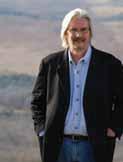


Ulrich Jr., John, Edmond, Okla., member of Memorial Road MB Church, Edmond, Aug. 30, 1934—April 29, 2015. Parents: John and Esther Ulrich. Spouse: Gladys Ulrich. Children: Dolores Thrasher, Donna Grossman, Diana Ishmael; four grandchildren; one great-grandchild.
Wall, JoAnn, Hillsboro, Kan., of Hillsboro MB Church, Sept. 27, 1951—March 16, 2015. Parents: Ray and Clela (Lugbill) Hein. Spouse: Richard Wall, deceased. Children: Jenny Yamazaki, Julie Beam; two grandsons.
Associate Pastor: Ebenfeld MB Church, Hillsboro, Kan., is seeking a full-time associate pastor at a church entering a new season of ministry. Duties include leading/planning worship services and leading the youth ministry program for a congregation of approximately 200. Inquires or resumes should be sent to Ebenfeld MB Church, PO Box 35, Hillsboro, KS 67063 or by email to secretary@ebenfeld.org.
Youth Pastor: Corn MB Church of Corn, Okla., is looking for an evangelical, scripturally grounded youth pastor for 30-plus high school and 10-plus junior high youth. Unique, rural community, housing provided. New youth building and experienced youth sponsors. For a complete job description or to send an application, contact Corn MB Church at 580-3432274, cornmbchurch@itlnet.net or Mark at 580-4502999, mvgraf@gmail.com
Worship Minister: Shorelife Community Church in Capitola, Calif., is seeking a worship minister to give leadership to our worship team and congregation in weekly worship. This part-time position (10 hrs/wk) also has the potential of developing into a pastoral role of reaching and ministering to young families. Interested persons may send inquires or resumes to Daniel Clubb at daniel@shorelifecc.org or Shorelife Community Church, 875 Monterey Avenue, Capitola, CA 95010 or contact him at (831) 462-7490. (www.shorelifecc.org)
Senior Pastor: Heritage Bible Church in Bakersfield, Calif., is a Mennonite Brethren church that is seeking a full-time senior pastor for our congregation. We are looking for a prayerful, godly shepherd who loves the Lord and people and can bring spiritual insight through preaching and personal relationships. Inquiries or resumes should be sent to hbcseniorpastorsearch@gmail.com or P.O. Box 203, Bakersfield, CA 93302.
Lead Pastor: Bible Fellowship Church in Rapid City, SD, is seeking a full-time lead pastor for our congregation of approximately 180. Inquiries or resumes should be emailed to: PastorSearch@BFCRC.com
Lead Pastor: Community Bible Church, Mountain Lake, Minn., is seeking an intentional and visional lead pastor with a heart and call to ministry in a small community. This position is salaried and comes with a housing package, health insurance, paid vacations and flexible hours. Interested candidates should contact Bob Ewert at rewert@frontier.com or (H) 507 678 2221 or (M) 507 920 3472 or send your resume to Community Bible Church, 500 Klein Street, Mountain Lake, MN 56159 or communitybible@frontiernet.net. Further information can be found at www.cbcmountainlake.com.
Russian Evangelical Church, Shakopee, Minn., hosted a national youth convention for Slavic youth at Grace Church of Minneapolis (Minn.) April 24-26. There were more than 3,000 youth in attendance and nearly 40 speakers. Jon Wiebe, president and CEO of MB Foundation served as one of the speakers and seminar leaders.
Community Bible Church, Olathe, Kan., offered a seven-week course on the Gospel of Mark, titled “Christianity Explored,” beginning April 12.
Associate Pastor: Kingsburg (Calif.) MB Church is seeking a full time associate pastor for worship and youth for a congregation of approximately 150. Inquiries or resumes should be sent to Kingsburg MB Church, 1301 Stroud Ave, Kingsburg, CA 93631 or emailed to kmbcsearch@gmail.com
Business Administrator: Reedley Mennonite Brethren Church in Reedley, Calif., is seeking a fulltime Business Administrator. The person called to this ministry would oversee the financial, facility, information systems, personnel management and general administrative functions of RMBC. Contact sheila@reedleymbc.org for a job description or to submit your resume.
University Job Openings
Director of Seminary Advancement: Fresno Pacific University Biblical Seminary and Advancement is seeking candidates to fill the director of seminary advancement position. Qualified candidates are
North Fresno (Calif.) Church offered a 10-week Sunday school class on mental health and the church, beginning April 12.
Bethesda Church, Huron, SD, hosted a May 12 seminar, “Unfiltered,” to equip parents for ongoing conversation about Internet pornography. Fairview (Okla.) MB Church started a new class for young married couples April 12.
Neighborhood Church, Visalia, Calif., offered a three-week “lab” on “ISIS, Islam and Jesus,” beginning April 30.
encouraged to apply for this exciting opportun-ity. Please check out the website http:// www.fresno.edu/visitors/careers/director-seminaryadvancement to learn more about the position. If you are interested in applying for this position, please complete a staff application from http://www.fresno.edu/sites/default/files/hr-staffapplication-06-08.pdf and submit it to careers@fresno.edu at your earliest convenience. Questions may be directed to Nayely Carlos, HR Analyst, at (559)453-7112 or Nayely.Carlos@fresno.edu or Mark Isaac, Vice President of University Advancement, at (559)453-2000 or Mark.Isaac@fresno.edu.
Visit Europe the Mennonite way! Multiple hotel tours focusing on Mennonite-Anabaptist history in Holland, Belgium, Germany, Switzerland, Poland and Ukraine. Organized by Mennonite Heritage Tours, www.mennoniteheritagetours.eu
